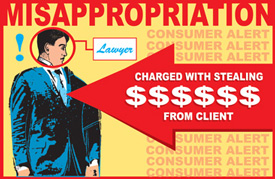Steal client funds and charges
may be posted online
By Nancy McCarthy
Staff Writer
 Lawyers accused of stealing more than $25,000 from their clients could find a consumer alert, in addition to the charges, posted on the State Bar website if the board of governors agrees to seek input from the public about a proposal from its chief prosecutor.
Lawyers accused of stealing more than $25,000 from their clients could find a consumer alert, in addition to the charges, posted on the State Bar website if the board of governors agrees to seek input from the public about a proposal from its chief prosecutor.
Placing a consumer alert on a lawyer’s online profile on the bar’s website would complement other efforts to prosecute lawyers accused of major misappropriation — the theft of $25,000 or more from one or more clients. Bar prosecutors currently have 113 pending investigations of misappropriation charges against some 55 lawyers.
Chief Trial Counsel Jim Towery said that although only a handful of lawyers steal substantial sums from their clients, their actions account for 59 percent of the claims paid out by the bar’s Client Security Fund (CSF), which reimburses clients for their lawyers’ dishonest conduct. Of the $3.5 million CSF paid to victims in 2009, $2,037,121 involved reimbursement due to misappropriation, “by far the largest dollar amount paid in any single category of fund claims,” Towery said.
He put together a major misappropriation team last month in order to prosecute such cases quickly and aggressively. The group’s goals include early identification of thieving lawyers, expedited investigation and accelerated prosecution, including efforts to place those lawyers on “involuntary inactive status” because they pose a threat of harm.
“We believe such aggressive measures are necessary to swiftly remove these lawyers from practice to avoid further harm to other clients and the public,” said Towery.
Despite those efforts, unsuspecting current or prospective clients may be unaware that a lawyer has been charged with major misappropriation because the lawyer remains active while the case is pending. As a result, Towery wants to post an alert on the lawyer’s profile page on the bar’s website when either a “threat of harm” petition or disciplinary charges are filed.
Although all notices of disciplinary charges for professional misconduct currently are posted, Towery said that “stronger public protection measures are warranted to protect current or prospective clients from additional harm.”
The proposed consumer alert would say: “The State Bar of California has filed disciplinary charges against this attorney alleging that the attorney engaged in a major misappropriation of client funds. In order to read the Notice of Disciplinary Charges filed by the State Bar against this attorney, click (link). To learn more about the general nature of the disciplinary offense of misappropriation of client funds by an attorney, click (link).”
The web posting would be accompanied by a disclaimer that the charges are allegations only and the attorney is presumed innocent until the charges are proven.
“The problem from the defense point of view is this gives the Office of the Chief Trial Counsel a very powerful weapon to essentially impact a lawyer’s practice, perhaps put him out of business completely without having to go to court and prove their case,” said David Cameron Carr, who represents lawyers facing discipline charges. “When you combine the proposal with the huge megaphone that the Internet is, then you have a very powerful tool that prosecutors can use.”
Despite the disclaimers, Carr said the consumer alert would be hard to defend against. “Once it’s out there, everyone will assume it’s true and so that’s the issue we have with it.”
The seven-person major misappropriation team already takes several steps to address complaints from clients that their lawyer took their funds. As soon as such a complaint is filed, it is evaluated and, if it meets the established criteria, assigned to an investigator and a prosecutor. When possible, prosecutors will try to resolve the cases without filing charges, usually through an in-person meeting to examine the lawyer’s bank records. Towery said this approach saves time by avoiding a subpoena of bank records.
“In our experience,” he said, “given the limited defenses available in most misappropriation matters, in-person meetings held early in the investigation stage also conserve prosecutorial efforts and valuable resources: We may be able to reach an appropriate stipulation or other resolution, including a stipulation to disbarment, without filing formal proceedings.”
In the interim, prosecutors can file a “threat of harm” petition under Business and Professions Code § 6007(c), which can result in a lawyer losing his or her license pending the resolution of disciplinary charges.
The misappropriation team also refers lawyers to law enforcement for possible criminal prosecution and has established direct contacts with many district attorneys and police agencies.
If it gets a green light from the discipline committee, the proposal will go out for 45 days of public comment.